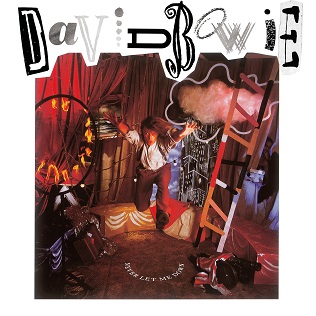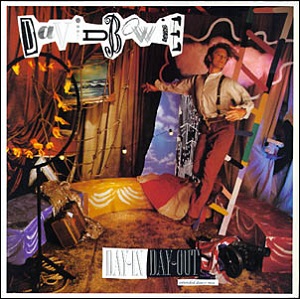
"Under Pressure" is a song by the British rock band Queen and singer David Bowie. Originally released as a single in October 1981, it was later included on Queen's 1982 album Hot Space. The song reached number one on the UK Singles Chart, becoming Queen's second number-one hit in their home country and Bowie's third, and also charted in the top 10 in more than 10 countries around the world.

Reality is the 24th studio album by English musician David Bowie, originally released in Europe on 15 September 2003, and the following day in America. His second release through his own ISO label, the album was recorded between January and May 2003 at Looking Glass Studios in New York City, with production by Bowie and longtime collaborator Tony Visconti. Envisioned by Bowie as a set of songs that could be played live, most of the musicians consisted of his then-touring band.

David Bowie is the second studio album by English musician David Bowie. After the commercial failure of his 1967 self-titled debut album, Bowie acquired a new manager, Kenneth Pitt, who commissioned a promotional film in hopes of widening the artist's audience. For the film, Bowie wrote a new song, titled "Space Oddity", a tale about a fictional astronaut. The song earned Bowie a contract with Mercury Records, who agreed to finance production of a new album, with Pitt hiring Tony Visconti to produce. Due to his dislike of the song, Visconti appointed engineer Gus Dudgeon to produce a re-recording for release as a lead single, while he produced the rest of the album.

"Life on Mars?" is a song by the English singer-songwriter David Bowie, from his 1971 album Hunky Dory. Written as a parody of Frank Sinatra's "My Way", it was recorded on 6 August 1971 at Trident Studios in London. Co-produced by Bowie and Ken Scott, the backing band consisted of guitarist and string arranger Mick Ronson, bassist Trevor Bolder and drummer Mick Woodmansey; Strawbs member Rick Wakeman played piano. Primarily a glam rock ballad, with elements of cabaret and art rock, the song has a complex structure, containing different chord changes throughout. Lyrically, it describes a girl who goes to the cinema to escape reality, using surreal images, thematically reflecting optimism and the effects of Hollywood.

Tonight is the 16th studio album by English singer-songwriter David Bowie, released on 24 September 1984 through EMI America Records. The follow-up to his most commercially successful album Let's Dance (1983), it was written and recorded in mid-1984 at Le Studio in Morin-Heights, Canada, following the conclusion of the Serious Moonlight Tour. The music on Tonight has been characterised as pop, blue-eyed soul, dance and rock. Much of the album's sound is the same as its predecessor's, due to Bowie's effort to retain the new audience that he had recently attracted, although some tracks contain R&B and reggae influences.

Never Let Me Down is the 17th studio album by English musician David Bowie, released on 20 April 1987 through EMI America Records. After a series of miscellaneous projects, Bowie hoped to make his next record differently following his disappointment with Tonight (1984). It was recorded at Mountain Studios in Montreux, Switzerland and the Power Station in New York City from September to November 1986. It was co-produced by Bowie and David Richards and featured contributions from Peter Frampton on guitar. Musically, Never Let Me Down has been characterised as pop rock, art rock and hard rock; Bowie himself considered the record a return to rock and roll music. The cover artwork features Bowie surrounded by numerous elements from the songs.
"Aladdin Sane (1913–1938–197?)" is a song by English singer-songwriter David Bowie, the title track from his 1973 album Aladdin Sane. Described by biographer David Buckley as the album's "pivotal" song, it saw Bowie moving into more experimental musical styles following the success of his breakthrough glam rock release The Rise and Fall of Ziggy Stardust and the Spiders from Mars in 1972.

"John, I'm Only Dancing" is a song by English musician David Bowie, originally released as a non-album single on 1 September 1972. A glam rock and R&B number, the lyrics describe a situation in which the narrator informs his lover not to worry about the girl he is with because he is "only dancing" with her. Although ambiguous, many interpreted it as concerning a gay relationship. Recorded in London in June 1972, it was boasted by a low-budget promotional video directed by Mick Rock. It reached number 12 in the UK; RCA refused to release it in America due to its suggestive lyrical content.

"Rock 'n' Roll Suicide" is a song by English singer-songwriter David Bowie, originally released as the closing track on the album The Rise and Fall of Ziggy Stardust and the Spiders from Mars on 16 June 1972. Co-produced by Ken Scott, Bowie recorded it with his backing band the Spiders from Mars – comprising Mick Ronson, Trevor Bolder and Mick Woodmansey. It detailed Ziggy's final collapse like an old, washed-up rock star and, as such, was also the closing number of the Ziggy Stardust live show. In April 1974 RCA issued it as a single.

"Day-In Day-Out" is a song recorded by English singer David Bowie, serving as the opening track for his seventeenth studio album, Never Let Me Down (1987). It was issued as a single on 23 March 1987 ahead of the record's release. The recording was solely written by Bowie, while production was handled by him along with David Richards. An R&B track, "Day-In Day-Out" criticizes the treatment of the homeless in the United States at that time, and deals with the depths to which a young mother sinks to feed her child.

"Time Will Crawl" is a song recorded by English singer David Bowie, serving as the second single for his seventeenth album, Never Let Me Down (1987). It was written by Bowie and produced by him and David Richards. Released in 1987 by EMI, the recording addresses the destruction of the planet by pollution and industry; the Chernobyl disaster was a direct influence on the lyrics. The accompanying video served as a teaser to Bowie's Glass Spider Tour (1987). Music critics reviewed "Time Will Crawl" positively, commending its lyrics and production, and describing it one of Bowie's best efforts of the mid– to late–1980s. Additionally, Bowie later called the song one of his favorites from his entire career. Commercially, the single peaked at number 33 on the UK Singles Chart and at number seven on Billboard's Mainstream Rock Tracks chart.

"Never Let Me Down" is a song recorded by English singer David Bowie, serving as the title track for his 1987 studio album of the same name. It was released as the third and final single from the record in 1987, and served as his last solo single until 1992's "Real Cool World". "Never Let Me Down" was written by the singer himself and Carlos Alomar, while production was handled by Bowie along with David Richards.
"The Supermen" is a song written by English singer-songwriter David Bowie in 1970 and released as the closing track on the album The Man Who Sold the World. It was one of a number of pieces on the album inspired by the works of literary figures such as Friedrich Nietzsche and H. P. Lovecraft.
"The Bewlay Brothers" is a song written by English singer-songwriter David Bowie in 1971 for the album Hunky Dory. One of the last tracks to be written and recorded for the LP, the ballad has been described as "probably Bowie's densest and most impenetrable song".

"Moonage Daydream" is a song by English singer-songwriter David Bowie. It was originally recorded in February 1971 at Radio Luxembourg's studios in London and released as a single by his short-lived band Arnold Corns in May 1971 on B&C Records. Bowie subsequently re-recorded the song later that year with his backing band the Spiders from Mars—comprising Mick Ronson, Trevor Bolder and Mick Woodmansey—for release on his 1972 album The Rise and Fall of Ziggy Stardust and the Spiders from Mars. The re-recording was co-produced by Ken Scott and recorded at Trident Studios in London in November 1971. The re-recording is a glam rock song that uses melodic and harmonic hooks, as well as percussion and guitar influenced by heavy metal. On the album, the song directly introduces the character Ziggy Stardust, who describes himself as a bisexual alien rock superstar who will save the Earth from the impending disaster described in the opening track "Five Years". It features saxophone played by Bowie and a guitar solo and string arrangement by Ronson.

"Ziggy Stardust" is a song written by English singer-songwriter David Bowie for his 1972 concept album The Rise and Fall of Ziggy Stardust and the Spiders from Mars. Co-produced by Bowie and Ken Scott, he recorded it at Trident Studios in London in November 1971 with his backing band the Spiders from Mars—comprising Mick Ronson, Trevor Bolder and Mick Woodmansey. Lyrically, the song is about Ziggy Stardust, a bisexual alien rock star who acts as a messenger for extraterrestrial beings. The character was influenced by English singer Vince Taylor, as well as the Legendary Stardust Cowboy and Kansai Yamamoto. Although Ziggy is introduced earlier on the album, this song is its centrepiece, presenting the rise and fall of the star in a very human-like manner. Musically, it is a glam rock song, like its parent album, and is based around a Ronson guitar riff.
"Andy Warhol" is a song written by English singer-songwriter David Bowie in 1971 for the album Hunky Dory. It is an acoustic song about one of Bowie's early artist inspirations, the American pop artist Andy Warhol.

Nothing Has Changed is a compilation album by English musician David Bowie. It was released on 18 November 2014 through Parlophone in the United Kingdom, and Columbia Records and Legacy Recordings in the United States. The album was released in four formats: a triple CD version, a double CD version, a double LP version, and a single CD version released exclusive to select countries.

Loving the Alien (1983–1988) is a box set by English singer-songwriter David Bowie, released on 12 October 2018. A follow-up to the compilations Five Years (1969–1973), Who Can I Be Now? (1974–1976), and A New Career in a New Town (1977–1982), the set covers the period of Bowie's career from 1983 to 1988, his most commercially successful period, and includes eleven compact discs or fifteen LPs.
"Let Me Sleep Beside You" is a song written and recorded by English singer-songwriter David Bowie. It was recorded on 1 September 1967 at Advision Studios in London and marked the beginning of Bowie's working relationship with producer Tony Visconti, which would last for the rest of Bowie's career. A departure from the pop and music hall-influenced material of Bowie's 1967 self-titled debut album and other singles for Deram Records, the song displays a more rock-oriented sound with a cello arrangement from Visconti. The impressionist lyrics also depart from Bowie's prior works, describing love using the act of sleeping together rather than through emotional attachment. The song was rejected by Deram for release as a single, purportedly due to the risqué title. It remained unreleased until 1970's The World of David Bowie compilation.















